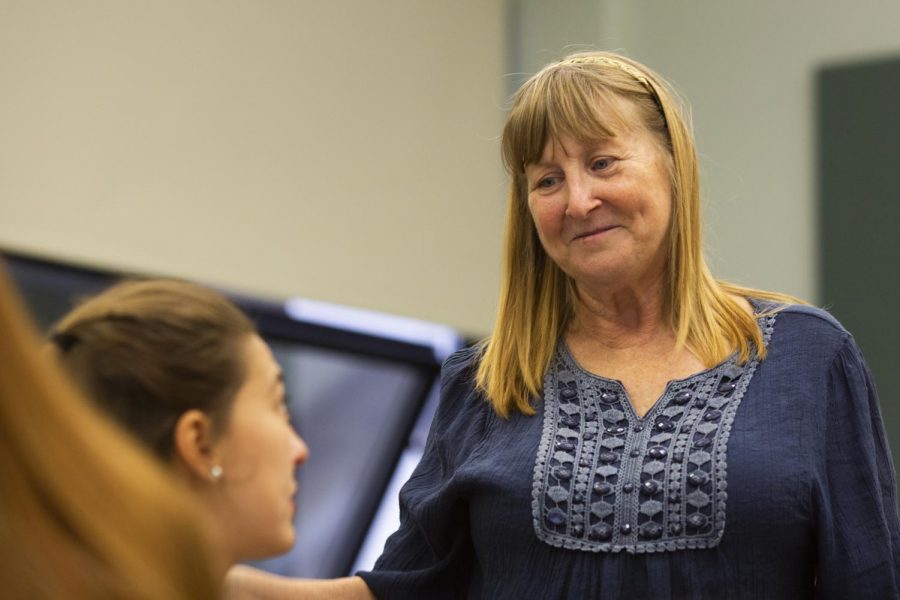Speech to text: One professor’s 20-year endeavor
October 22, 2019
Dictionaries aren’t usually much cause for excitement, but that is not the case for Elizabeth Winkler, a professor in the WKU English department. To her, reading a dictionary is far more than grabbing a dusty volume off a shelf to look up a word.
Winkler teaches English as a second language and other courses within the field of linguistics, which she de- scribed as “the study of language, its forms and its usages in real communities.” It is this area of study which led to her unique relationship with dictionaries.
Around 20 years ago, Winkler worked with a native speaker of Kpelle, a West African language also found in Liberia and Guinea-Bissau. Winkler learned the language did not have a written dictionary despite being completely functional and Liberia’s most spoken first and second language.
In response, Winkler decided to undertake the arduous task of creating a dictionary for the Kpelle language.
“If I had known what a nightmare doing a dictionary would be, I probably would have never started it,” Winkler said with a laugh. “It’s horrible, tedious work.”
Winkler explained the work is tedious because it means figuring out what constitutes a word. This is particularly difficult for words which don’t refer to a concrete object or action but rather an abstract idea or transition word.
Winkler said Kpelle differs from other languages in that it views things from a different perspective. For example, body parts are labeled differently in Kpelle than English.
“This language doesn’t divide arm and hand, it divides right here at the elbow joint down,” Winkler said. “How do you figure out those kinds of things?”
A phonetic dictionary was published about three years after Winkler began work on it.
To her surprise, Winkler learned the dictionary was being purchased across the world, including in the United States. She found everyone from veterans, nurses and doctors wanted to learn Kpelle for a variety of reasons such as teaching their children and understanding patients.
Winkler was later approached by native speakers interested in establishing Kpelle as the national language of Liberia. This meant the language would need a written system.
“I’m the pasty white lady from outside — I’ve got no right to be making these decisions for native speakers,” Winkler said. “So I worked with native speakers to get them to create the writing system.”
Winkler noted her job wasn’t to create or alter the language already in place but to act as a scribe.
“They created the system,” Winkler said. “I’m just taking the system that these people decided on, and I’m the one who wrote down the words.”
Winkler acted as an adviser for the native speakers, pulling linguistic examples from other languages in order to show what opportunities existed for Kpelle. With this newly written language, the Kpelle dictionary will be writable not just in phonetic characters but also its own written language.
The creation of a written language included many obstacles, however.
Winkler said certain areas which speak the language exhibit alternate pronunciations, meaning a single altered sound can change the meaning of a word. Winkler found one word could be said three different ways depending on the geographic location of the group saying it. The system had to note all of these pronunciations.
“This language has all kinds of sounds that don’t exist in English,” Winkler said. “It’s highly complex.”
Winkler said when the written language is completed and becomes used regularly, native speakers will continue to modify it. The same occurs with English and other languages.
“Now it really belongs in the hands of local people,” Winkler said. “So as soon as I finish this, I will be turning over the whole thing to native speakers who can then take it, own it, publish it in their own country, modify it, fix it.”
By passing the project off to native speakers, Winkler said she hopes the publishing project will create jobs and lower prices of the final product, given it will be published and sold locally in Liberia.
“I feel like I’ve done what I can do,” Winkler said.
WKU English professor Trini Stickle said Winkler’s work reflects an important step in preserving both language and culture.
“Many languages go extinct in precisely these kinds of situations,” Stickle said. “Children are taught in the national language, and they may simply not acquire all the features of the home language. After enough time, these languages die — the last speakers take that knowledge with them. So, when linguists work with a community to preserve an oral language by documenting the features of that language in written form, they are helping preserve not only a language but a culture.”
Winkler’s 20-year endeavor with the Kpelle language has taken her on a rollercoaster of obstacles and emotions, but it ultimately left her with a variety of lessons, Winkler said.
“You can’t just operate out of the academic ivory tower,” Winkler said. “You’ve got to get down with normal people and look at what normal people’s lives do. Things I do may impact people.”
Features reporter Julie Sisler can be reached at [email protected]. Follow Julie on social media at @julie_sisler.













